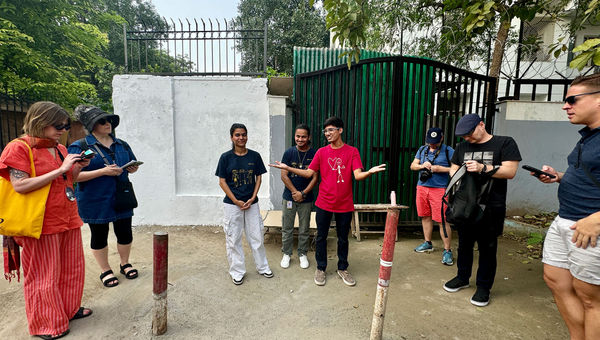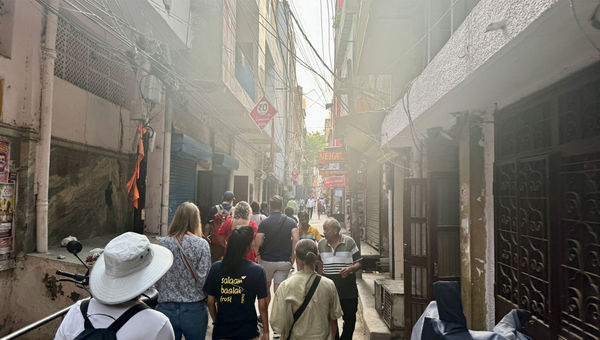JAIPUR, India -- Arriving in India's capital city, New Delhi, for the first time, I had a burning question: Where are all the women?
As the G Adventures press group I was traveling with weaved in and out of throngs of men crowding street corners, alleyways, shops and restaurants in the area around the New Delhi Railway Station, I felt slightly intimidated and outnumbered. There were hardly any women in sight.
Our group was on a walking tour hosted by a local community tourism organization, Salaam Baalak Trust, which is supported by the adventure tour operator's nonprofit arm, Planeterra. It was among Planeterra projects visited in India's "Golden Triangle" of New Delhi, Agra and Jaipur in the days preceding the company's second annual GX Summit.
Salaam Baalak Trust supports, shelters and educates street children in India through tourism initiatives and partnerships that also bring awareness to circumstances that force children onto the streets. Its efforts are geared toward providing safe homes, education and, eventually, employment.
While on our walk, my question about the absence of women was partly answered.
Our three guides, Jafar, Kadjal and Salman, explained that unhoused boys are often easier to bring into Salaam Baalak's programs because they're easier to find in public, where it's common to see them selling goods -- sometimes, illicit goods -- on the street. Girls, however, are harder to find and help because they need to take extra precautions to protect themselves while living on the street and are usually in hiding. Sometimes, street girls are forced to find shelter in brothels, making finding them even more difficult.

Salaam Baalak Trust tour guides, in the middle, from left, Kadjal, Jafar and Salman. Photo Credit: Nicole Edenedo
My question would be answered in full later in the week by Meenu Vadera, founder of the Azad Foundation and its women-led transportation service in New Delhi, Women With Wheels. On a panel at the GX Summit about community tourism enterprises empowering women, she said that others had also asked about the lack of women in public spaces; it's a common question her organization fields when picking up first-time visitors to the city.
"India is a very gendered society, with very strict gender roles; definitely, the place of women is supposed to be within the four walls of the home," she said.
Vadera told those attending the panel that this, in part, motivated her to start the Azad Foundation and Women With Wheels in 2008. She wanted to provide dignified livelihoods for women in India and help them claim a means of independence and discover a life outside traditional gender norms.
By training women to be chauffeurs, the Azad Foundation "breaks these concrete walls around women to bring them out on the road so they can become active citizens of this world," Vadera said, noting that Women With Wheels is now in several countries, including Germany and France.
"They're not just earning money. They don't just become empowered women. They learn to take control over their jobs, their lives and their bodies," she said.

A Salaam Baalak Trust walking tour in New Delhi. Photo Credit: Nicole Edenedo
Women lead the way
A focus on women took center stage again when G Adventures introduced women-powered sustainability initiatives and its new collection of solo trips that will be led by female tour guides, launching in 2025. The message seemed to be: Women not only play a role in the future of travel; they are the future of travel.
Bruce Poon Tip, chairman and founder of G Adventures, said that "63% of the employee base in tourism is female, and 65% of people who travel on our trips are women. Look at solo travel, look at couples. Women decide the travel [plans] in 85% of couples. Women absolutely drive the tourism economy."
In the days leading up to the GX Summit, which took place on World Community Tourism Day, around 400 travel professionals -- suppliers, travel advisors and media -- were hosted on itineraries that included visits to women-led tourism projects supported by Planeterra.
In Agra, awareness of violence against women in India, particularly in the form of acid attacks, was highlighted on a visit to Sheroes Hangout, where female survivors of these attacks run a coffeehouse and cultural center. These survivors, most of whom are disfigured, face discrimination, which, among other things, makes it difficult for them to find jobs.
Thanks to Sheroes Hangout, they can work in a safe environment, reclaim their lives and advocate for stricter laws and protections for women.
In Jaipur, women entrepreneurs are given a safe space to sell their handmade goods and services while learning skills for financial independence at Anoothi India, a women-led social enterprise. G Adventures travelers can participate in craft-making and shop locally sourced products in the pop-up marketplaces Anoothi sets up.
The goal of this year's GX Summit was simple: demonstrate how community tourism not only helps educate, employ and empower women but how investing in women-led tourism initiatives can move the industry forward toward its goals of sustainable and responsible tourism.
"There's so much data that shows that when you educate women, educate girls, everything is better: communities are stronger, more vibrant, more successful," Poon Tip said.